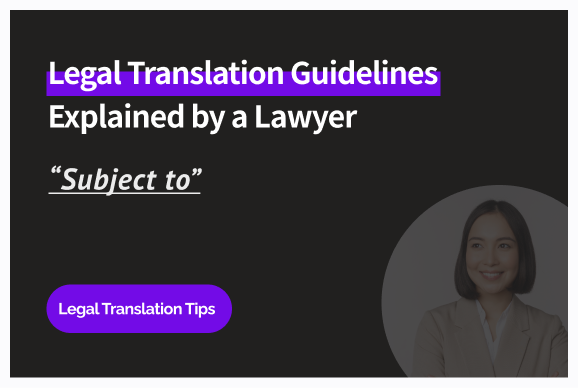Today, we’re diving into the common phrase “subject to” often seen in English contracts. This term means “dependent on” or “subject to,” and it is frequently used in contracts to indicate that certain conditions or situations must be met.
Using “subject to” clarifies the extent to which a contract is effective based on certain conditions, ensuring the enforceability of the contract. It also specifies how particular obligations or rights are limited or influenced by other conditions. Therefore, understanding and correctly reflecting the “subject to” clause in contracts is crucial.
✍🏻 What is the role of “subject to”? Specifying Contractual Conditions
Let’s explore the role of “subject to” in contracts and how to interpret it. The “subject to” clause indicates that the enforceability of a contract may depend on whether specific conditions are met.
For instance, if a clause states, “This agreement is subject to financing,” it means that if financing is not secured, the contract may become void. This highlights financing as a critical condition of the contract.
Similarly, “subject to board approval” signifies that the contract requires the board’s approval to be valid. The “subject to” clause significantly affects the enforceability of a contract by specifying the conditions under which the contract is valid.
Here’s how “subject to” can be interpreted:
- “Subject to the approval of the Board, the new policy shall be implemented.” → “The new policy will be implemented, contingent upon the board’s approval.”
- “The obligations of the parties are subject to the terms and conditions set forth in this Agreement.” → “The parties’ obligations are contingent upon the terms and conditions specified in this Agreement.”
✍🏻 Caution in Translating “subject to”
Legal disputes may arise from the “subject to” clause, especially if parties claim conflicting interests or unmet conditions. To prevent such issues, it is advisable to clearly and specifically draft or translate contracts.
“This agreement is subject to regulatory approval.” → “This agreement must receive approval from the regulatory authorities.”
In addition to the above clause, it is important to specify which regulatory authority’s approval is required.
“subject to applicable laws” → “Subject to the applicable laws.”
This clause indicates that the terms of the contract may change according to domestic or international laws.
“subject to the terms and conditions herein” → “In accordance with the terms and conditions specified herein.”
By using “subject to” as in the above examples, you can clarify the interrelated nature of each clause within a contract, thereby reducing legal uncertainties. The “subject to” clause plays a significant role in clarifying the responsibilities and obligations of the contracting parties.
🫠 Struggling with contract translation?
BeringAI is an AI translator specializing in legal document translation. It is designed to accurately translate legal terms and phrases, enhancing the precision of documents such as contracts.
The biggest advantage is that it is trained on data reviewed by legal experts, ensuring precise translations of nuanced legal terminology and context. BeringAI offers fast and efficient translations, saving both time and costs.
Translating a contract with BeringAI is simple. Just upload the document you wish to translate and select the legal professional translation option. BeringAI will then accurately recognize legal terms like “subject to” and provide context-appropriate translations. Using a professional AI translator ensures more accurate and efficient contract translations, enhancing the quality of legal document translation and helping prevent legal issues in international transactions.
Experience the world’s leading legal translation with Bering AI for free today!
🧑🏫 Bering Lab’s Solution for English Contract Translation
Today, we explored the role of the “subject to” clause in English contracts and how to interpret it. When translating legal documents, it is crucial to translate the conditions and implications of such clauses clearly. Ambiguous conditions can lead to legal disputes.
Understanding and translating key terms in English contracts accurately can determine the success of an agreement. By using Bering Lab’s professional legal translation services, you can ensure the accurate and efficient translation of these critical terms, guaranteeing the stability and precision of international transactions. Bering Lab offers an AI translation engine suitable for “business” document translation tailored for “English contract translation.”
Currently, more than 130 law firms globally are utilizing our services, alongside numerous global corporations. Trusted and chosen by the top law firms in Korea, Bering Lab offers “English contract translation” services through BeringAI and BeringAI+ three times faster and 40% cheaper. Experience the high quality of specialized translations like legal and contract translations reviewed directly by lawyers at Bering Lab!
Contact Bering Lab today for contract translations reviewed by professional lawyers!

